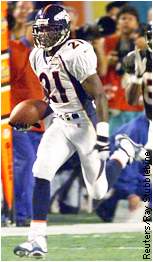
|
Monday, Feb. 1 5:30pm ET Secondary plays primary role for Denver |
|||||||
MIAMI -- Remove John Elway's performance from the equation, and the
Broncos secondary, targeted as Denver's weakest unit all season, might have been the biggest key to Super Bowl XXXIII.
All the talk leading up to the game was about Denver's run defense, about how stingy the Broncos had been against the run and their battle against Jamal Anderson. But the defensive backfield overshadowed the run-stuffing front seven and refuted its critics in Denver's 34-19 victory over Atlanta.
The Broncos' secondary was responsible for all four Falcons turnovers, which resulted in 14 fourth-quarter points. They intercepted three Chris Chandler passes, two by Darrien Gordon, and forced a fumble on Atlanta's final possession to punctuate their dominating performance.
"We had already proved ourselves against Miami; we blew them out," said Gordon, who also intercepted two passes in the AFC Championship Game. "Against the Jets, we shut them down. They were still talking about our secondary, about how weak we were. But we had only given up six points in two playoff games. I think we feel vindicated."
During the regular season, the Broncos ranked only 26th in pass defense, allowing 228 yards per game. The secondary was deemed the team's only Achilles' heel, blamed for back-to-back losses to the Giants and the Dolphins.
But defensive coordinator Greg Robinson, quick to defend his players, said the stats were grossly misleading, not at all indicative of the secondary's season.
"I know this: They've been playing well," Robinson said. "(Regardless of) all this stuff about our secondary, I like the guys we've got. They've played well. They've given up yardage late in ballgames. People have a tendency to just read statistics. They don't really tell you that when games are on the line, our guys came up big."
Especially Sunday. Mirroring the Falcons' speedy receiving tandem of Tony Martin and Terance Mathis all over the field, Denver's defensive backs continually stalled the Falcons' red-zone opportunities and set up the Broncos' potent offense with favorable field position.
Chandler completed 19 of 35 passes for 219 yards and one touchdown, but most of his yards came in the fourth quarter, when Denver had as much as a 25-point lead. When the game was still undecided, he found fewer holes to exploit then he did two weeks earlier, when he riddled the Minnesota Vikings' secondary in the NFC Championship Game.
The Broncos' defense, which had allowed only 13 points in the playoffs, maintained its stinginess against the Falcons. Three times the Falcons advanced into the Broncos' red zone in the first half, and all three times Atlanta had to settle for Morten Andersen field-goal attempts.
"The whole thing boiled down to their success in the red zone," Falcons coach Dan Reeves said. "We had been so good there all year. We got down (there), and we had to settle for two field goals, and we also missed a field goal. They did a great job of keeping us out of the end zone."
On two consecutive plays in the second quarter with Denver leading 17-3, cornerbacks Tory James and Gordon batted down balls in the end zone, forcing Andersen back onto the field for another field goal.
"We just weren't working right today in the red zone," said Chandler, who had never thrown an interception in the red zone in his career as a Falcon before Sunday. "We usually just put the ball in the end zone once we get down there. It was frustrating."
In the third quarter, after Jason Elam missed a Denver field goal, the
Broncos' secondary came up with another huge play. Chandler forced the ball over the middle to Mathis and reserve Darrius Johnson intercepted, returning it 28 yards to the Falcons' 42.
Then on the Falcons' next possession, defensive tackle Keith Traylor
tipped a Chandler pass into the air and Gordon intercepted it on the run. Only Chandler prevented Gordon from scoring a touchdown after a 58-yard return.
"Usually, when I get in the open field, it's a touchdown," Gordon said. "My legs were just dead. I could feel it when I tried to make that cut. I tried to fake him and go inside, but I just didn't have any burst. I can't make any excuses. There's no reason, no matter what, that a quarterback should tackle me."
It was Gordon's turn again early in the fourth quarter. With the Falcons threatening again inside the red zone, Gordon picked off a pass for Martin at the 2-yard line and brought it back 50 yards, setting up the Broncos' final touchdown on John Elway's 3-yard run for a 31-6 lead.
And if that wasn't enough, Denver's safeties got into the act with 1:23 left in the game, this time against the run. Reserve George Coghill stripped the ball from Anderson and Tyrone Braxton recovered, putting the finishing touch on a Super Bowl repeat.
"Dan (Reeves) always comes in here with a very disciplined team, offensively and defensively, so we knew the key was going to be the turnovers," Braxton said. "If we get the ball back into our offense's hands, they're going to make some points."
Just like Denver's defensive backs made theirs.
|
| Copyright 1995-98 ESPN/Starwave Partners d/b/a ESPN Internet Ventures. All rights reserved. Do not duplicate or redistribute in any form. ESPN.com Privacy Policy (Updated 01/08/98). Use of this site signifies your agreement to the Terms of Service (Updated 01/12/98). |


 Sunday, Jan. 31
Sunday, Jan. 31